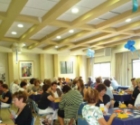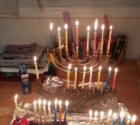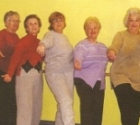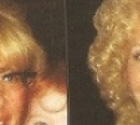
Translated Into English By
Norman Silbert
Photography By
She is known as the woman behind Mayumana: beautiful, vivacious and full of life.
Only a few know that Eylon Nuphar had breast cancer six years ago, like her mother and her grandmother.
“It brought us together,” she says. “It gave me a sense of belonging that I didn’t have before, and a pride in being part of a line of amazing women.”
Translated into English by Norman Silbert
Photography: Nir Yafe
This article and photos were originally published in La’Isha, Vol. 3314, 18.10.2010 and we thank La’Isha for their kind permission to translate and publish it in ESRA MAGAZINE.
When the mammography laboratory called me in Spain and asked me to return to Israel for further tests, I was devastated. I knew. I knew it was cancer. I started with palpitations and then hysteria struck. I called you, crying, angry and confused. The musicians stood next to me waiting for transport, not understanding my change of mood. Just a moment ago I had been carefree, laughing and happy. It had been an outstanding performance in an amazing venue.
“It’s cancer!” I yelled, and you asked calmly and with self-confidence “What scares you the most?” “I don’t know,” I answered crying. “Are you scared of dying?” “No!” I said firmly. “So what’s making you afraid? That you’ll lose a breast?” “Yes, I’m scared of everything; of the change; of changing.”
“So, at worst you’ll lose a breast and your hair will grow back,” said my mother.
After our talk I was a little more relaxed. “At worst you’ll lose a breast,” I told myself, “because I have no intention of dying.”
Eylon Nuphar wrote those disquieting words in her journal six years ago. She was then 33, at the height of her professional life. Mayumana, which she established together with Bo’az Berman and Ro’i Ofer, had evolved from an innovative group to a professional group of theatrical performers that was highly successful both at home and abroad. She also had a great new love which she described as having the sweet taste of cherries and the fragrance of freshly cut lawn. And then, without warning, cancer struck.
“It wasn’t easy, but I coped,” said Eylon, now 39 and back in full swing and involved in Mayumana. “The hardest moment, however, was when I learned that Racheli, my younger sister, also had breast cancer. That was my breaking point. I felt like everything was falling apart.”
Eylon and Racheli-Or, two of the Rolnick sisters, are not the only ones in their family to have breast cancer. Their mother and grandmother both had it and all of them are carriers of the genetic mutation known as BRCA 1.
This was not something the women in the family knew when the mother, Sima, was diagnosed with cancer at 48; nor did they know when her eldest daughter was diagnosed at 33. Only as a result of their illness did they all go to be tested. They were found to be carriers of the defective gene and all had breast cancer. Shir (36), however, the middle daughter, an artist and therapist trainer, is not a carrier.
“When I discovered I had breast cancer,” said Sima, “I took it quite calmly.” Sima Rolnick (63) lives in Zur Yig’al. “When Eylon told me she had it, I didn’t see it as so terrible; I knew she could still live a full life. But when we discovered that Racheli also had it, that was excruciating. When the doctor called after the biopsy and said: ‘You all have to come in,’ I fell apart and burst out crying. Why? Why Racheli as well? That was more than I could bear.”
Neither a boy’s name nor a girl’s name
Eylon Nuphar was born Ilana, but when she was 14 she changed it to Eylon because “it’s neither a boy’s name nor a girl’s name.” Always challenging norms, she asked to cut her beautiful hair when she went with her father to a religious beach reserved for men so that “no one could tell me I could or could not go anywhere.”
And your mother agreed?
“Without any argument. My mother is a very liberal-thinking person. She encouraged us to be who we are and to let our personalities shine. So was my father. They both gave us the strength to be independent.”
The eldest daughter of Sima and Aryeh Rolnick, she was born in the United States and lived as a child of nature in Florida. When she was six, her parents decided to return to Israel with their three daughters.
“My father told us we were going to the Land of Milk and Honey, and brought us to Kfar Saba. I was in complete shock. The reality was horribly disappointing. During the first year I didn’t know a word of Hebrew and refused to talk until I knew the language. That was my silent year. I was angry with my parents and wanted to go ‘home.’ This was ‘home’, they explained. When in fourth grade I went to visit my grandmother in Florida I realized I was no longer American.”
In ninth grade she decided to go to school on Kibbutz Ma’ale Hahamisha as a boarder. “Since we came back to Israel I had lived in a boarding school because my father was the deputy principal, and then the principal of the school. I saw the children who lived there being independent and wanted the same for myself. The reality was less simple. The kibbutz is a closed and stereotypical society and I had a tough time socially and culturally. I suffered humiliation but never gave in. I decided not to leave until I could do so with pride.
“At the end of tenth grade, after I had become accepted and they stopped calling me ‘that city hippie,’ I realized that I could leave. In retrospect, I had some good friends and memories from the kibbutz. It was there that I learned how to cope with unwanted situations, and that running away was never an option.”
She returned home to live with her parents and was accepted at Kfar Saba’s Katzenelson high school to study music and theater. It was her mother who established the music track and headed it until her retirement a year ago. “I achieved excellent grades in the subjects I loved, and didn’t take the exams for subjects I didn’t.”
The army was also not quite for her. “I tried but it just never worked. At 19 I married a fantastic and special person. We used the money from the wedding gifts to travel for a year through Europe and the United States by motorbike. When we came back we renovated an old bus and lived in it in an orange grove. We were married for two years, during which he went through a process of becoming religious. We parted amicably and today he’s a rabbi in a Breslav Hassidic community and is married with children.”
During that time Eylon worked as a film editor and started her ongoing love affair with percussion instruments.
“My youngest sister Racheli started studying percussion instruments and I was drawn to them. I looked for the best teacher and found Bo’az Berman. Together, we later established Mayumana.”
I wanted it all
At 22 she began appearing in various ensembles. A year later she joined Ya’ir Dalal’s troupe and toured the world with him, studying belly dancing at the same time.
"While touring, I began to dream about my own group that would combine both my talents and not limit me to either music or dancing. I wanted it all. My life partner, Bo’az Berman, shared my dream and we began gathering together people who looked interesting. We rehearsed, and after six months replaced everyone except for one girl. Some 700 came to our auditions: We chose seven, and together with us that made 10. We were then joined by Ro’i Ofer, a producer who worked on large television productions. Together with him we founded Mayumana."
That was in 1995. "During the first two years", she says, "there was no income. I used to make sandwiches at home; some went back to living with their parents. Bo’az and I lived in a tiny apartment near the sea. He appeared with Yehuda Poliker and others. The whole time we continued to practice, acquiring new skills, improving and diversifying our performance, and giving free rein to artistic expression. Slowly but surely, taking small but daring steps, we followed our dream. We began appearing at Tzavta. Reviews were excellent and the audiences swelled. Six months after the first performance we decided that we wanted our own theater. From the outset we knew this would be an enormous undertaking and not just a performance that starts and ends."
Ten years ago they rented the building being used by the Gesher Theater and turned it into a home for Mayumana. “At the age of 27 I was already a signatory to a whole bunch of documents and guarantees. Bo’az, Ro’i and I took a big risk. Over time we matured. We trained more groups and began appearing simultaneously both locally and internationally. Today, Mayumana numbers over 100 people.”
At 27, after five and a half years of being together, the romance with Bo’az ended: “But he’s still my best friend. Just like family. True, it wasn’t easy to carry on working together but it was clear to both of us that it was worth the effort. Today, both Bo’az and Ro’i are married and each has a child. I’m a godmother.”
The world welcomed Mayumana with open arms. In Chile they appeared in a reality show called “Who Wants To Be Mayumana?” In Spain they appeared for several consecutive years, and Eylon even lived there on and off for two years, becoming the partner of Matthew Jessner, the artistic director of Cirque du Soleil which was appearing in Spain at the same time.
Ten frozen embryos
She found out about her illness in stages.
“I was 32 when, one night, I told my partner that I could feel something in my breast. I did a mammography in Israel but the results were negative. I returned to Spain and forgot about it. About a year later I traveled to Brazil for a vacation with my good friend, film director and producer Gali Me’iri. She photographed me throughout the trip. She even considered making a film about our friendship. When we returned she carried on photographing me, and she and her camera were with me when I learned I had cancer.”
The emotional and revealing film, Transparent Time, was shown on television three years ago. It has become part of Eylon Nuphar’s battle with breast cancer and deals with the discovery, the tests, the treatments and even the issue of freezing embryos in the event that the treatments leave her unable to become pregnant.
When did you discover you were ill?
“About a year after the mammography I found another lump in my breast. This time Gali put me in touch with a friend of hers, a doctor who refused to let me neglect the situation. She ‘allowed’ me to travel to Argentina for two months, but when I came back she sent me for another mammography. A couple of days later I was in Spain because I had commitments – but that was when I received the call from the laboratory: ‘Where are you? Come and get the results.’ While listening, the reality slowly dawned on me. I called my mother, crying hysterically,” she said, reliving the moments described in her journal. She returned to Israel immediately and was sent for a biopsy. “Gali photographed me standing opposite the doctor when she too heard that the growth was not benign.
“It took me time to dare to ask: Just a minute, what is cancer? They tell you everything but avoid saying the word. Straight away they tell you about the stages you will go through; lumpectomy (removal of the lump and preservation of the breast), chemotherapy, losing your hair, radiation therapy, and aspiration of your eggs. You leave with a terrifying list of tasks that are destined to become the greatest production of your life.”
Who is the donor you chose?
The first decision she had to make was who would be the sperm donor to turn the eggs into embryos that could be frozen.
“It wasn’t easy. The relationship with my partner at the time was still too new to make a decision that would commit us for many long years. A very close friend offered to donate sperm without involving him in parenthood - on the face of it, an offer not to be refused. I said ‘yes,’ but when I went to the doctor and he asked me what I had decided, I heard myself saying only the words ‘a sperm donor.’ I wanted independence here too.”
"One meter eighty five, brown hair, brown eyes, an art student from England. That’s all I know."
Six years later, 10 frozen embryos are waiting in the hospital until Eylon decides to use them. In the meantime, she’s in no hurry. “I don’t want to be a single mother: that, and the fact that the child will never know where it comes from. I don’t want to bring a child into the world just to fit society’s norms. I’m in no rush.”
A year after her cancer was discovered Eylon underwent surgery, chemotherapy and radiation treatment. When she started chemotherapy she held a head-shaving party in which her friends, her sisters, and her parents participated. “Each one took a turn to cut my hair.” Also during treatments her close friends and family were with her. “My mother brought origami and puzzles and we watched movies. In the meantime the treatments were being absorbed into my body.” During the time between treatments and feeling bad – or worse - and while she was bald, she appeared in Zappa with her sister Racheli: “I felt so alive,” she said.
Were you angry at your mother who transmitted the defective gene?
“If anything, I was angry about the freckles I inherited from her,” she laughs. “If the gene brings with it creativity, the joy of living, optimism, and a long life – then that’s my genetic heritage from her. I was never angry at the fact that I became ill. I thought a lot about what I should do to make sure I don’t get ill again, but everything took on completely different proportions when Racheli also became ill. Before that, I thought that my frenetic lifestyle and the fact that I always wanted to do things my way caused my cells to decide ‘to do things their way.’ When Racheli became ill, I realized that none of those things had caused me to get ill. Racheli is a very different person from me. And yet we became ill at the same age, in the same breast, with the same diagnosis. After she became ill, the way I looked at things changed. Now I take far less responsibility for the fact that I became ill.”
Her process of treatment and recovery was long and debilitating. “But the real problem starts when all the fanfare and support are over and everyone gets back to their routines. That’s when you have to get back to living; but you can never go back to who you were.”
Who are you today?
“Today I am a woman who knows herself, who has learned what compassion is, who cares a great deal about others and the people around her, and the world: A woman who wants to find a way to make a small change and to be generous, because we never know how long we’re going to be here.”
While talking, she reveals her story.
“Today the story is about the family, not just about me. It’s a happy story about a family,” she says, surprisingly. “The experience really brought us together. It gave me a sense of belonging that I didn’t have before, and a pride in being part of a line of amazing women. The fact that we could be with my younger sister and watch her while she took everything so stoically and the fact that we were all there to support her created a sense of strength and powerful love.”
Why just when everything is going well?
Racheli-Or (34) is welcomed into Eylon’s home with motherly warmth. “Do you want to eat?” the older sister asks and goes to the kitchen to prepare her an organic salad along with 'gefilte fish that Dad made.'
Racheli-Or – named Racheli-Orli at birth – Rolnick-Sheleg, newly married to Gili Sheleg (40), is a drummer, an equine therapist, and is studying water therapy. When she was 19 her mother was diagnosed with cancer.
“I don’t remember much. We knew, but it wasn’t traumatic. Mom wasn’t stressed, and continued to work as usual. She didn’t have chemotherapy,” says Racheli, and Eylon corrects her: “Mom did have chemotherapy. I went with her to the treatments.”
Both sisters agree that they don’t remember their mother’s illness as a difficult experience. “Nor was our grandmother’s illness,” they note. “I think I was the one to bring trauma to the family,” says Eylon.
Racheli, were you with Eylon during her treatment?
“I was, but there were people all around her and she kept the family at bay, not allowing us to visit as much as we wanted. It was a very difficult year for me. A good friend of mine was ill and died at the age of 28, our grandmother died at 89, and Eylon was ill.”
Eylon: “That’s why I didn’t want Racheli to come with me all the time.”
Racheli: “When I met Gili, I told him that I carried the gene, but said I would not become ill. I said it and believed it completely. I was convinced it would never happen to me. After seven months together he proposed, and two weeks after we told everyone I learned that I had breast cancer.”
That was two years ago. While working at a stable, she was bitten by a horse above her right breast – near the armpit. When Racheli felt a small lump in her right breast and a swelling in her armpit, she thought it might be related to that bite. When she consulted a doctor she was immediately sent for a biopsy; and then the doctor called. Accompanied by her mother, together with her sister Shir and her partner, she went to the doctor where she was given the news.
“The days following were filled with anger. I asked why this was happening to Mom and Dad – when one of their daughters had already gone through this - and why it was happening to me just when everything was going well. But, a week later I was already more optimistic.”
She, like her sister, underwent aspiration of her eggs, freezing the embryos, and all the treatments that entailed.
Weren’t you afraid that Gili would back out?
"Yes, of course. Look what the poor man had to deal with. He went through a tough year. Our love was blossoming, and then suddenly I looked different, felt different, lacked energy and was tired. But he was good to me. He was there for me, showered me with love and told me that he thought I was the most beautiful woman. Every day he asked me again and again: 'Do you want to marry me?'"
Were you angry at your mother for passing on the defective gene?
“I would never swap my family.”
To us, cancer is not the road to death
The Rolnicks are a special family: artistic, creative, warm, loving, and involved. Their home in Zur Yig’al is filled with Sima’s origami work, the girls’ paintings, collections of things that came from Sima’s mother, and family pictures.
Sima, a New-York-born music student, volunteered in Israel for a year at the age of 19. After three months in an ulpan she was sent to teach at the Hadassah Ne’urim boarding school. There she met physical education teacher, 29 year-old Arye Rolnick, who came from Lithuania.
“We both played musical instruments. He played Russian songs on the guitar and I played American songs on the guitar and banjo. Together, his English and my Hebrew were not exactly a winning combination. In fact, we had almost no common language. He had gone through bad times in Europe during the war while I was a little girl in Larchmont, N.Y. The relationship shouldn’t have lasted more than two weeks.”
And yet, 43 years ago they were married and went to the United States. “We planned to be there for two years and stayed ten, during which time we earned academic degrees, worked, and had three daughters.”
They then came back to Israel. Aryeh Rolnick was deputy principal of the Steinberg boarding school in Kfar Saba. Sima worked in the municipal conservatory and taught at the Katzenelson high school for 30 years.
“We lived in boarding schools for 22 years until we bought this house. We bought it when my 82-year-old mother came to live in Israel and we looked for a home that would be suitable for her as well. She lived with us for six and a half years and it was wonderful – for her and for us.”
Was it your mother who started the genetic line linked with breast cancer?
“It’s more complicated than that. My mother had uterine cancer at 59, the age at which her mother died of the same thing. She got breast cancer when she was already 80. I got breast cancer before her, when I was 48. I was surprised because I always thought it would be uterine cancer. But even when I felt a lump I took it calmly. For us, cancer is not “the road to death”. As you know, my mother died at 89 after two episodes of cancer.”
How did you react to the illness of your daughters?
There were two completely different reactions. When Eylon found the lump I wasn’t shocked because I had had the experience of my own illness. I had no idea what she was going to go through. Later, when I learned about Racheli I knew what was in store for her. My own experience did not prepare me for what happened to my daughters. I remember that when Racheli was diagnosed, I said: ‘Thank God my mother isn’t alive because she would have died! ’
“Today I know it’s not in our hands, but I do believe it’s all behind us. Now I only hope Racheli will be able to use the frozen embryos after they are tested to see that they’re not carrying the gene (that’s possible today, but six years ago it wasn’t when Eylon froze her embryos). Cancer in our family must stop in this generation.
Epilogue: The interview for this article took place in August of 2010.
Eylon is closing in on 41 and Racheli and Gili are the proud parents of a baby girl, born in October, 2011. They named her Refael (yes, another boy's name) "healed by God" since she reflects the fact that Racheli was healed, allowing her to produce this child.
To see and hear an interview with vivacious and beautiful Eylon Nuphar on Mayumana, here is the link to the video: https://www.youtube.com/watch?v=QNYQnFpUA_Q&feature=player_embedded
 ESRA College Netanya is reborn
ESRA College Netanya is reborn ESRA HERZLIYA ACTIVITIES
ESRA HERZLIYA ACTIVITIES Chanukah Celebration at ESRA Rishon LeZion
Chanukah Celebration at ESRA Rishon LeZion  Yad Sarah's new house in Raanana
Yad Sarah's new house in Raanana English speaking Feldenkreis
English speaking Feldenkreis Men don't Make Passes at Girls who Wear Glasses
Men don't Make Passes at Girls who Wear Glasses